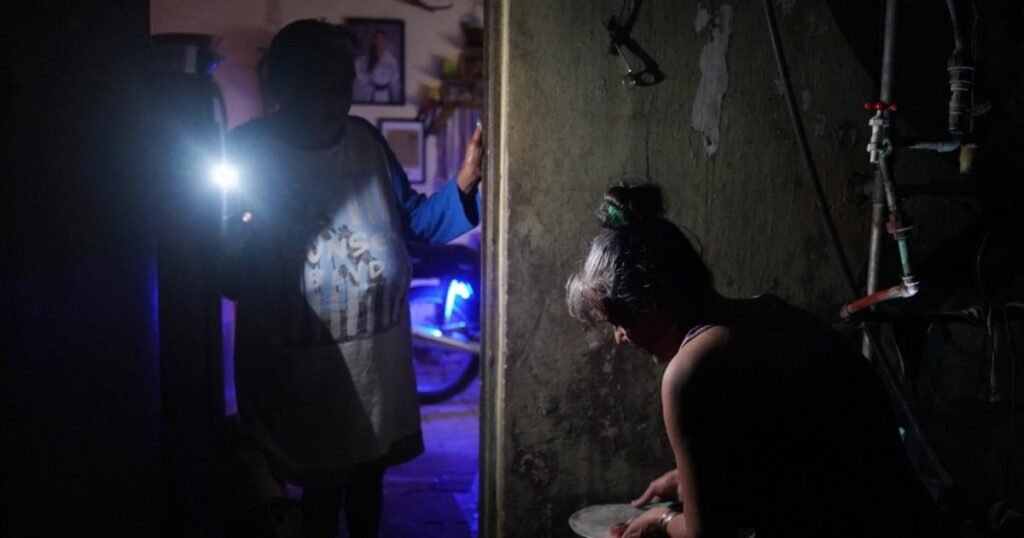HAVANA — Some progress has been made in restoring power across Cuba, but much of the island remained dark Saturday after the power grid collapsed for the second time in less than 24 hours.
The first power outage occurred across the island around 11 a.m. Friday after the Antonio Guiteras thermoelectric power plant, the island’s largest power plant, failed. Almost all of Cuba’s 10 million residents were in the dark.
While power was being restored, another complete grid collapse occurred around 6:15 a.m. Saturday, surprising many across the country.
During the repairs, Hurricane Oscar occurred off the coast of the Bahamas, and the Cuban government issued a hurricane warning for the eastern states of Guantanamo, Holguin, and Las Tunas.
There were few cars on the streets of the capital, Havana, on Saturday. The traffic lights were not working. People were out looking for food because much of what was in the refrigerator had spoiled. A limited number of stores were open. Some state-run stores operated without electricity, while some privately run stores operated using generators.
A woman boils water and another lights a fire with her mobile phone during a nationwide power outage in Matanzas, Cuba, on Friday. Antonio Levy/AFP – Getty Images
In the capital’s upscale district of Vedado, the government opened an open-air market in a park on Saturday selling agricultural products such as root vegetables, rice and some vegetables.
In Old Havana, residents expressed frustration and anxiety over the situation.
“The situation is unbearable and I hope it gets resolved as soon as possible,” Alexia de la Cruz said as she stood outside her home. “The situation has become very dire.”
“The situation is unbearable. It’s so bad it’s going to explode,” neighbor Luis Utoria said.
Some pointed to political solutions to Cuba’s ongoing power outage problem.
“This problem can be solved by having friendly relations with us and making an agreement with the closest country (the United States) that we don’t want to make any concessions to,” said a 74-year-old man who declined to be named.
Power outages have been chronic in Cuba for years, and have worsened in recent months.
Before Friday’s collapse, the government had tried to avoid a complete blackout by closing schools and keeping most state workers at home to conserve energy, but it wasn’t enough.
The communist-run country’s aging and crumbling infrastructure requires regular maintenance, and the government has often blamed the decades-long U.S. embargo on Cuba for making parts imports difficult. Ta.
Cars drive on the road Saturday during a nationwide power outage due to power grid failure in Havana. Adalberto Roque/AFP-Getty Images
The government also blames increased energy demand and a shortage of fuel used to start factories for the constant power outages. In some provinces outside the capital, Havana, many people are enduring power outages lasting up to 20 hours at a time.
On a state news program Friday night, President Miguel Diaz-Canel said no one would rest until power was restored. He blamed the U.S. embargo on Cuba for the country’s lack of needed fuel and foreign currency. He warned that periodic power outages would continue across the country even after power was restored.
Cuba’s Foreign Minister Bruno Rodriguez reiterated that message on Saturday’s X. He said the damage caused by the embargo over 18 days was equivalent to “the annual cost of maintaining the country’s electrical energy system.” He said there would be no power outages once the embargo is lifted. “The U.S. government could assist the Cuban people if they wanted to…”
During a nationwide power outage in Havana on Friday, several buildings in the city were seen with electricity. Adalberto Roque/AFP – Getty Images
Cuba is in the midst of an economic crisis caused by tougher U.S. sanctions under former President Donald Trump’s administration and the pandemic’s devastating impact on the island’s tourism industry, one of the government’s most lucrative sources of income. It’s in the midst.
The state-run economy relies primarily on imports, and a lack of foreign currency has left Cubans grappling with shortages of food, medicine, water, and fuel.
Oil supplies have been severely restricted after Venezuela, Cuba’s ally and major oil supplier, cut back on exports to Cuba. Other countries that have supplied oil in the past, such as Russia and Mexico, are also reducing shipments.
Cuba’s economic crisis is causing mass immigration. More than 1 million people, or 10% of Cuba’s population, fled Cuba between 2022 and 2023, according to the country’s National Statistics Institute.
Orlando Matos reported from Havana and Carmen Cecin from Miami.

